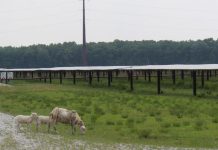By Mitch Daniels
TheStatehouseFile.com
The once serene and secure world of higher education has been shaken in recent years by challenges few saw coming. Enrollments have dropped, layoffs have become common, and a few colleges have closed down entirely. There has been a stunning drop, from 75 percent to 44 percent, in Americans saying that “a college degree is very important.â€
A barrage of unprecedented questions now is asked every day: Are too many young people going to college? Are they learning anything meaningful or useful while there, or just enjoying a four-year party of prolonged adolescence? Can as good an education be delivered more conveniently through the new technologies of the internet? And loudest of all, the question, “Why does it cost so much?â€
Some leaders of higher ed have reacted defensively and critically, disputing the premises of these critiques and perhaps believing that this storm will all blow over soon. At Purdue University, we take a different view: We accept the legitimacy of the concerns now so prevalent, and the responsibility to provide education of indubitable quality, at a price our students’ families can afford. As we phrase it, “Higher Education at the Highest Proven Value.â€
First, ours is a place of rigor. As Indiana’s most STEM (science, technology, engineering, math) centered university, we teach a lot of very difficult subjects. Whereas the phenomenon labeled “grade inflation†has seen average grades skyrocket across the country, until employers and graduate schools are in some cases unsure what a high GPA means anymore, As and Bs are still hard to come by at Purdue, where the mean GPA has barely moved for decades.
We accept the challenge to deliver quality that cannot be acquired simply sitting in one’s living room in front of a laptop. Boilermakers are much more likely than students elsewhere to be involved in undergraduate research, to work on team-based projects in addition to conventional homework, to study abroad or in off-campus internships as part of their experience. They are far more likely to encounter “active learning†courses taught in new ways. Increasingly, lectures are watched on personal computers or handheld devices, with class time devoted to projects, exercises, or individual instruction aimed at those aspects the student found most difficult.
And we don’t ask people to take our word for it. In partnership with the world-renowned Gallup Research organization, we launched the Gallup-Purdue Index, the largest-ever survey of how college graduates are succeeding in life, and why. We simultaneously studied Purdue alumni, and now can prove what we already suspected: Boilermakers do better in later life, not just financially but also in other, as Gallup terms them, “domains of wellbeing.†But the data also pointed to ways, like more one-to-one mentoring by our faculty, where we can do better, and we are determined to apply those lessons.
Our commitment to accountability will next extend to measuring the intellectual progress of students while they are at our university. Starting next fall, we will check the growth in critical thinking of our students, again with an eye to constant improvement.
We are investing heavily in building even further the disciplines on which Indiana’s economic future so greatly depends. Our College of Engineering, already one of the top-ranked in the world, will grow by another 1000 students. Our Department of Computer Science, which was the first of its kind in the world and just marked its 50th anniversary, will grow by almost 30%. And our College of Technology is working to transform itself into a new Purdue Polytechnic Institute, producing 21st Century degrees such as robotics, sensors and embedded devices, cloud computing, and unmanned aerial systems. The PPI will employ innovative methods such as a heavily project-based curriculum, regular work-study internships, and a competency-based system in which students will move as fast as their demonstrated mastery permits, instead of on the traditional semester-by-semester calendar.
Another way we seek to deliver proven value to our fellow taxpayers is by more often and successfully converting Purdue research into things of value in the marketplace. We have totally restructured our policies and practices to remove any possible obstacles, and to support to the maximum extent possible, those of our brilliant faculty who wish to commercialize their discoveries, and it’s working: 2014 saw a record number of patents and licenses, and 24 new Indiana companies, twice the all-time record and four times the Big Ten average. Purdue was named the international Best Incubator Network of the Year.
Lastly, that matter of cost. Citizen concern on this count is well-founded. Nothing, not even health care costs, has risen so rapidly as the cost of higher education. Schools everywhere have raised tuition and other charges at almost three times the rate of general inflation. Student debt, which helps fuel and mask this increase, skyrocketed past a trillion dollars.
Purdue was not by far the worst offender, but we did participate in this escalation, with both tuition and room and board costs going up every year for decades. We broke from this pattern in 2013, by freezing tuition and cutting food costs 5%. We followed this up with a second 5% reduction, and two more years of frozen tuition. Total cost of attendance has dropped for two straight years, the first time on record, and student debt is down 18%, or some $40 million.
When Abe Lincoln and his allies created land grant colleges like Purdue, their goal was to expand knowledge in those areas of learning most directly contributing to the economic growth of the nation, and to throw open the doors of higher education beyond the wealthy elite, to young people of all incomes and backgrounds. At Purdue, we believe passionately in the nobility of that continuing mission, and in our duty to respond effectively to the concern of students, parents, and taxpayers.
America is home to the world’s finest higher education system, and it’s essential that it stay that way. We Boilermakers hope to do our part in forging the changes that will preserve and strengthen that system, by providing what so many are now rightly demanding: Higher Education at the Highest Proven Value.
Mitch Daniels is president of Purdue University and a former Indiana governor.




